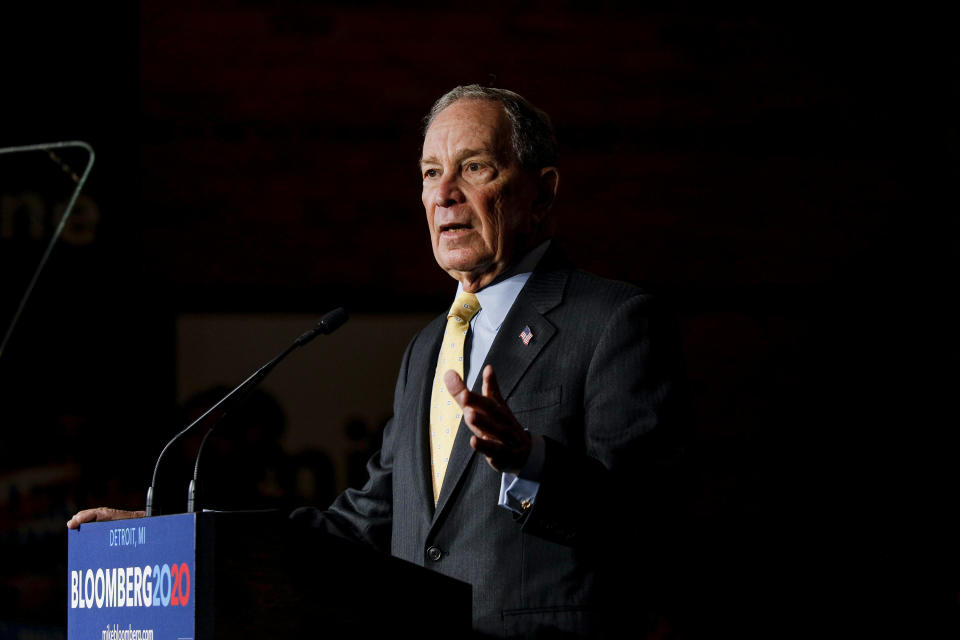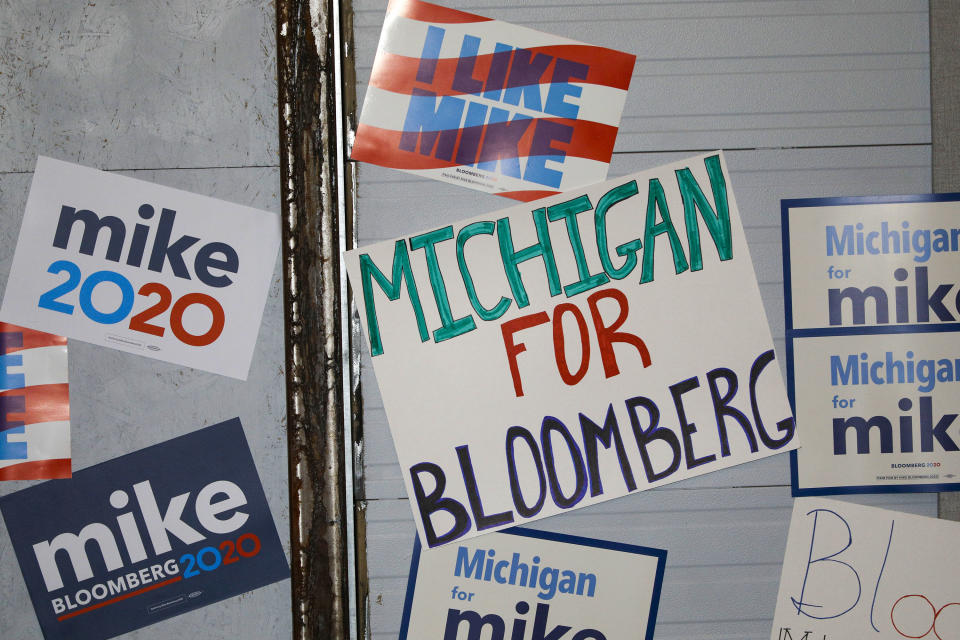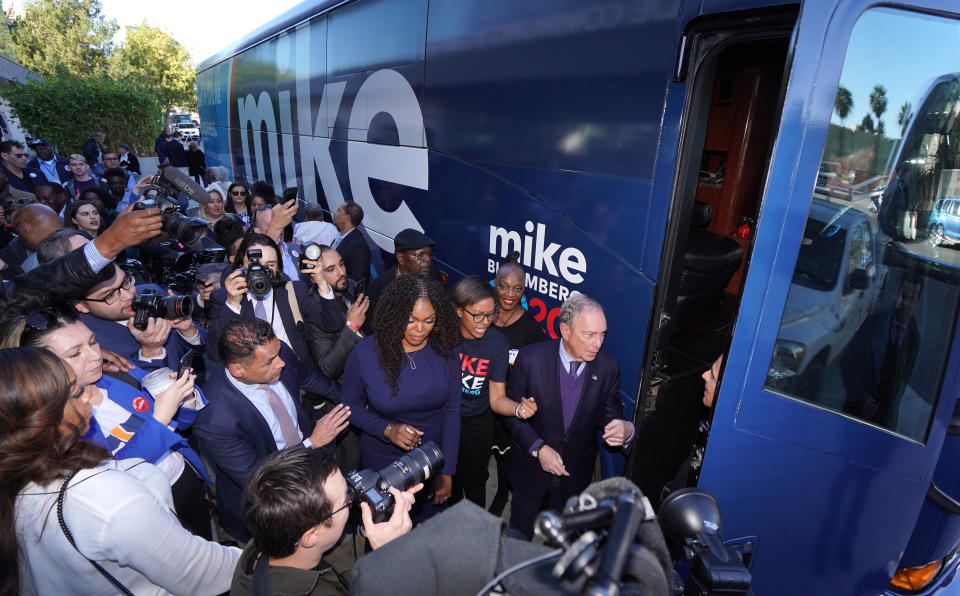Trump tells Dems to nominate 'Mini Mike Bloomberg ASAP.' Should they take his advice?
In the wake of the Democratic Party’s Iowa caucus debacle, President Trump took to Twitter Wednesday morning to offer his opponents some sarcastic advice.
“Iowa is a complete disaster for the Dems,” Trump tweeted. “They should bring in Mini Mike Bloomberg ASAP!”
Bloomberg, the multibillionaire former mayor of New York, immediately retweeted Trump’s “endorsement,” adding a chin-scratch emoji as if to say, “Now that’s something worth pondering.”

Bloomberg’s viability is certainly something that people — or at least pundits — have been pondering in recent days. As the Iowa fiasco unfolded Monday night, and as the talking heads struggled to fill hours of cable news airtime set aside for caucus results that ultimately never came, many started to speculate about how the muddled outcome could boost Bloomberg’s candidacy. Hot takes about Bloomberg as the “real winner” of the Iowa caucuses followed the next day. Soon, Bloomberg himself was jumping on the bandwagon, announcing that he would double his behemoth ad budget and expand his gargantuan field staff to capitalize on the post-caucus confusion.
“Yesterday I hear something happened in Iowa. Or didn’t happen. I don’t know which,” Bloomberg quipped at a Tuesday afternoon campaign stop in Detroit.
Bloomberg’s strategy is unprecedented. By skipping all four early-voting states and pouring hundreds of millions of dollars into advertising and organizing for the later, larger-state primaries — particularly in key battlegrounds such as Pennsylvania and Michigan and delegate-rich places such as Massachusetts and California — he has bet that no consensus candidate will emerge by Super Tuesday and that Democrats will eventually turn to him (and his $60-billion fortune) to fill the void.
Iowa’s chaotic, divided results may have helped Bloomberg’s cause. “This all seems like a much more possible outcome than I thought was remotely conceivable even a week or so ago,” progressive journalist Josh Marshall wrote Wednesday.

First, Iowa delivered a self-described “gut punch” to fourth-place finisher Joe Biden, Bloomberg’s fellow establishment moderate, and increased the likelihood of further gut punches to Biden in New Hampshire and Nevada. Second, the Hawkeye State elevated former South Bend, Ind., Mayor Pete Buttigieg, another moderate who could siphon off just enough centrist voters to cripple Biden’s candidacy — yet seems unlikely to attract enough voters of color in the South and the Southwest to deliver his own knockout punch. Finally, the caucuses also reinforced the upward trajectory of Bernie Sanders, an anti-establishment progressive who, according to the latest polls, could very well win New Hampshire, Nevada and the big Super Tuesday prize of California. The thinking in Bloomberg HQ is that a split decision between Biden and Buttigieg in the so-called moderate lane would pave the way for Bloomberg to sweep in at the 11th hour as a kind of fallback option: the establishment’s last best chance to stop Sanders.
He’s “the technocratic billionaire looking all competent and capable, waiting in the wings,” Neal Kwatra, a New York-based operative who is not affiliated with any presidential campaign, told Politico. And that “looks even more appealing to skittish and restive Democrats” after Iowa.
Bloomberg’s position has improved since he entered the race last November. At the time, he was polling at 4 percent nationally, according to Morning Consult; earlier this month, the same pollster found him at 14 percent — far ahead of Buttigieg and tied with Elizabeth Warren for third. Meanwhile, Bloomberg’s net favorability rating among Democratic primary voters has skyrocketed from a meager +5 percent in November to a robust +33 percent today. The reason? Fifty-nine percent of Democratic primary voters told NBC News and the Wall Street Journal last month that they had seen a Bloomberg ad on TV or social media — more than double the percentage who had seen ads from Sanders, Biden or Warren and more than five times the percentage who had seen an ad from Buttigieg. The betting site Predictit now gives Bloomberg better odds of winning the nomination than Biden.

But along with Bloomberg’s major advantages — namely the $315 million he’s spent so far — it’s worth considering a few disadvantages. The first is enthusiasm: Only 12 percent of Democratic primary voters told NBC/WSJ they would be “enthusiastic” about Bloomberg as the nominee (the lowest number among the top-tier candidates); 16 percent said they would be “very uncomfortable” (the highest number in the top tier). For comparison, majorities of Democrats said they would either enthusiastic or very comfortable with Sanders (69 percent), Biden (70 percent), Warren (66 percent) or Buttigieg (51 percent). Only 45 percent said the same about Bloomberg.
Which brings us to the mogul’s second major disadvantage. So far, his strategy has been to angle for a primary victory by conducting what amounts to a general-election campaign. “I’m not running against Bernie Sanders,” Bloomberg said Tuesday in Compton, Calif. “I’m running against Donald Trump.” His team has touted his swing-state spending, with Bloomberg himself mocking Democrats’ focus on the first four states as playing by the “old rules.” He and his campaign have trolled Trump incessantly, launching ads about the president’s “girth” and describing him in statements as “a pathological liar who lies about everything: his fake hair, his obesity, and his spray-on tan.” The worst thing Bloomberg has been willing to say about his Democratic rivals is that they aren’t “tough enough to go against Trump.”
This approach has its perks: Bloomberg polls as well as Biden in head-to-head matchups with Trump, and better than the other Democratic candidates. But to win the nomination you don’t have to beat Trump; you have to beat the other Democrats. And there may be no mathematically plausible way for Bloomberg to win without tearing the Democratic Party in two — and perhaps fatally damaging its prospects in November.
Why? Because 40 percent of the delegates will already be awarded after Super Tuesday on March 3, and given Buttigieg’s success in Iowa and Biden’s likely success in South Carolina (where the black vote has been buoying him all cycle) both of them will almost certainly stick around at least that long. In turn, the longer the anti-Sanders vote is divvied up between multiple moderates, the harder it becomes for any candidate to collect the 1,990 pledged delegates needed to win the nomination. Which means that even if Biden and Buttigieg fizzle in March, and even if Bloomberg emerges as the establishment’s white knight — big ifs to begin with — the only place he could likely beat Bernie would be at a contested convention.
Say no candidate gets a majority on the first ballot in Milwaukee. Then the Democratic superdelegates — the 771 elected officials, party elders, and activists who literally define the establishment — are allowed step in and tip the scales during the second round.

For a sense of what might happen if these superdelegates select the billionaire Bloomberg over the populist Sanders — particularly if Sanders arrives at the convention ahead in the delegate count — just look at how Bernieworld is reacting to a recent Democratic National Committee rules change that will likely help Bloomberg qualify for the Nevada debate later this month.
“We should be ashamed of that, as Americans, as people that believe in democracy, that the oligarchs — if you have more money, you can buy your way,” said Nina Turner, a national co-chair of Sanders campaign.
Meanwhile on Twitter, Sanders speechwriter Dave Sirota spent Wednesday attacking Bloomberg as “a ‘part-time resident’ of a foreign tax haven” who has “the entire journalism industry” under his thumb.
In other words, a second-ballot superdelegate victory for Bloomberg in Milwaukee would not go over well. “A lot of people … are going to be very upset if they feel like the election was stolen from them by a cabal of corporate types,” Jeff Weaver, Sanders’s top strategist, recently told the Atlantic. Anxious progressive groups are already plotting a “unified convention strategy” that involves Warren remaining in the race just so she can instruct her delegates to vote for Sanders.
The bottom line is that unless Bloomberg can use his money and his data to figure out a way to secure a delegate majority before Milwaukee, he risks creating the very problems his candidacy was supposed to solve: a more divided Democratic Party and a likelier second term for Trump.
Perhaps the president’s advice to “bring [him] in … ASAP” wasn’t entirely sarcastic.
Read more from Yahoo News:




